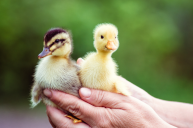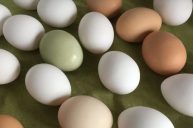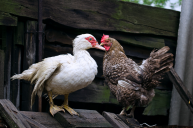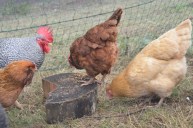There are pros and cons to raising any livestock whether it's chickens, ducks, Guineas, or peafowl. Let's look at some of the reasons to keep peafowl before we dive in! They're beautiful, good companions, lay eggs, and eat pests such as mice, frogs, and insects.
All that sounds great so why wouldn't we add peahens? They need lots of space. The rule of thumb is all poultry and fowl or game birds need space to be happy. Peafowl need a lot of space. They also require a lot of care and are loud during the breeding season. If you though Guineas were loud (they are) then consider this before adding peafowl.
"Raising peafowl is a decision that should not be taken lightly. While there are many good things about the experience, there are also many drawbacks. If thought about, chosen and cared for correctly, peafowl make a wonderful addition to any farmer, hobbyist or city person's life."
Let's unpack all the things we know about peafowl other than they're so beautiful! Even Martha Stewart has peafowl at her property, so you should, too.
A little history
https://www.instagram.com/p/Bw44MTYAdZ1/
The Indian peafowl originated in the Indian subcontinent while the Green peafowl is native to Asian countries from Burma to Java and prefer warmer climates. Peafowl are very loud creatures for several months of the year.
Housing requirements are crucial to having healthy birds
https://www.instagram.com/p/Bw3QjoknZM-/
Adults can be kept in pens or they can be allowed to free-range. Whether or not they free range, they should have access to an indoor area where heat can be provided during the winter months. Similar to chickens coops you'll see, wire fencing and wooden enclosures seem fairly typical for peafowl, though many people use netting for the enclosure ceiling.
Staff note: You must make sure your enclosures for adults have at least 100 square feet per bird, and the ceiling should be at least 6 feet high (though the higher the better). Roosts should be provided and it is best for these to have flat surfaces so their feet can lay flat on them.
Can they live with my chickens?
https://www.instagram.com/p/Bw2xK4TASk-/
The general rule is it's not a great idea because of Blackhead disease which chickens carry.
The main sign that your birds are suffering from Blackhead is general lethargy, depression, loss of weight, or in younger birds general lack of weight gain and wasting. If not treated, the infected bird will eventually die. Turkeys can also be affected.
It really varies on where you live and your parasitic management program.
What do they eat? Pellets? Crumbles?
https://www.instagram.com/p/Bw4-8xHF4yj/
They need a lot of protein!
Adult birds can be fed gamebird maintenance crumbles, pellets or turkey starter- as long as you can find some with 28-30% protein. They can also have treats like chickens. These include hardboiled/scrambled eggs, melons (watermelon, cantaloupe, etc), squashes, tomatoes, spinach, kale, mustard greens, dandelion, crickets, mealworms, wet cat food, pasta, cooked rice, raspberries, strawberries, and blueberries.
This video shows a poultry keeper adding a peacock to his flock.
Like I've said before, chickens are a gateway drug to other poultry and fowl! Once you have backyard poultry and fresh eggs daily it's exciting to think about keeping peafowl too. White peacocks are my fave! I'd love to add peacock eggs to the mix! Unfortunately, I worry about blackhead disease and my hen house isn't big enough for those long tail feathers.
Would you consider adding Pea Fowl to your flock? Please leave a comment below and let us know!
WATCH NOW: Why You Should Get Guinea Fowl




